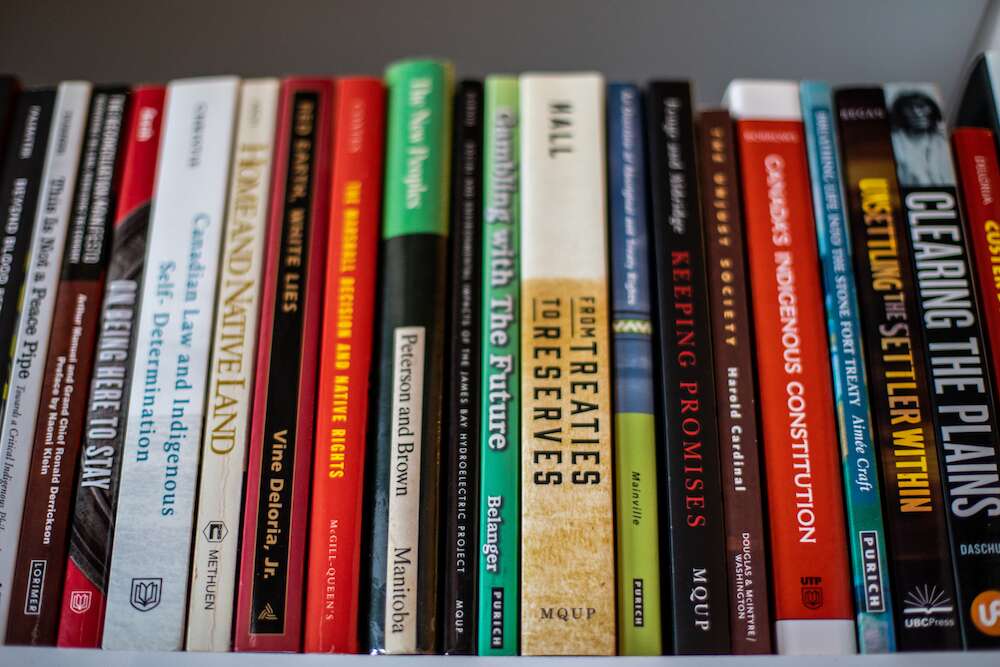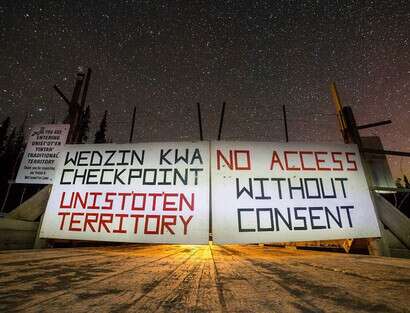Looking to learn more about Indigenous rights in Canada? Check out our reading lists below.
We would welcome any feedback or reading recommendations. Send us your suggestions.


Looking to learn more about Indigenous rights in Canada? Check out our reading lists below.
We would welcome any feedback or reading recommendations. Send us your suggestions.

Please consider ordering from independent bookstores offering local delivery across the country at this time.
Introductory text on Aboriginal law in Canada
Jim Reynolds, Aboriginal Peoples and the Law: A Critical Introduction (Vancouver: UBC Press, 2018)
History and analysis of Aboriginal and Treaty rights in Canadian law
International, Indigenous and Canadian law
Indigenous law and legal pluralism
Aboriginal law case summaries and commentary
Policy analysis
Truth and Reconciliation Commission Final Report
National Inquiry into Missing and Murdered Indigenous Women and Girls Final Report
Report of the Royal Commission on Aboriginal Peoples
Foundational works of Indigenous anticolonialism in Canada
Contemporary histories of Indigenous rights and political activism in Canada
History and analysis of the Indian Act
Introductory histories of Indigenous-Crown relations in Canada
Histories of settler colonial law
Graphic novel histories
Essay collection on Indigenous resurgence and reconciliation in Canada
Michael Asch, John Borrows, James Tully, eds., Resurgence and Reconciliation: Indigenous-Settler Relations and Earth Teachings (Toronto: University of Toronto Press, 2018)
Indigenous resurgence and Canadian settler colonialism
Settler decolonization in Canada
Indigenous legal research methodologies
Indigenous research methodologies
Linda Tuhiwai Smith, Decolonizing Methodologies: Research and Indigenous Peoples (London: Zed Books, 2012)
We have provided a list of resources below for anyone looking to get informed about the truth of Residential Schools shared by Survivors across the country. It is not meant to be an exhaustive list. We would welcome any feedback or recommendations. Send us your suggestions here.
Warning: these resources contain content Survivors and their families may find distressing.
National Residential School Crisis Line (24-hours/day): 1-866-925-4419
KUU-US Crisis Line Society (24 hours/day): 1-800-588-8717
Executive Summary
Volumes
Further TRC Reading
To accompany our readings lists, we thought it would be useful to share a list of multimedia resources for anyone looking to learn more about Indigenous rights in Canada through podcasts, videos and other media.
Here's a list of excellent podcasts covering a variety of important topics.
First Peoples Law's Bruce McIvor has been a guest on a couple of them.
Check out our own podcast featuring conversations on the defence of Indigenous rights!
Check out the National Film Board's Indigenous cinema collection.
Here are some of our personal recommendations.
Check out these informative channels on YouTube.
First Peoples Law's Bruce McIvor was featured as a guest panelist on TVO's video series NDN POV.
Indigenous Foundations also offers lots of valuable resources developed by the First Nations Studies Program at UBC, including a video lecture series on governance and land claims.
Here are some helpful resources relating to the work of the Truth and Reconciliation Commission, including a video reading of the TRC Final Report.
Here are a few online history and law courses.
Lastly, here is the syllabus for Bruce McIvor's previous course on current issues in Aboriginal law at UBC, including some additional resources like lecture presentations and YouTube clips.
Indigenous Peoples around the world continue to call on governments and courts to repudiate the doctrine of discovery.
We thought it would be useful to provide a list of resources for anyone wanting to learn more about the doctrine of discovery and support Indigenous Peoples’ calls to reject it.
It is not a comprehensive list. We would welcome any feedback or recommendations.
Here is a video introduction to the doctrine created by Anna Socha with audio from a Globe and Mail podcast interview with Bruce McIvor.
What is the Doctrine of Discovery? | Bruce McIvor | First Peoples Law LLP
Residential Schools and Reconciliation: A Canada Day Proposal | Bruce McIvor | First Peoples Law LLP
Why revoking the papal bulls is necessary | Bruce McIvor | CBA National
John Borrows, “The Durability of Terra Nullius: Tsilhqot’in Nation v British Columbia” (2015) 48:3 UBC L Rev 701
Peter P. D’Errico, Federal Anti-Indian Law: The Legal Entrapment of Indigenous Peoples (Westport: Praeger, 2022).
Kent McNeil, Flawed Precedent: The St. Catherine’s Case and Aboriginal Title (Vancouver: UBC Press, 2019).
Robert J. Miller, Jacinta Ruru, Larissa Behrendt, and Tracey Lindberg, Discovering Indigenous Lands: The Doctrine of Discovery in the English Colonies (Oxford: Oxford University Press, 2010).
Lindsay G. Robertson, Conquest by Law: How the Discovery of America Dispossessed Indigenous Peoples of their Lands (Oxford: Oxford University Press, 2007)
With so much media coverage of the Wet'suwet'en standoff prior to COVID-19, we thought it would be helpful to collect various articles, blog posts, interviews, case comments, and other resources in one location. We hope it will be a useful tool for anyone wanting to learn more about the situation in Wet'suwet'en territory and Indigenous Peoples’ ongoing struggle for justice in Canada.
Check out our new e-book and podcast episode on our Wet'suwet'en essay series.
Here is an article by First Peoples Law's Bruce McIvor published in 2019 following the RCMP raid at Gidimt’en.
Lawyers and legal scholars across the country have called on governments to uphold Indigenous rights and open a nation-to-nation dialogue with Wet’suwet’en Hereditary Chiefs.
Lawyers’ Rights Watch Canada has published a legal brief on Canada’s failure to abide by international legal obligations and its own rule of law.
First Peoples Law's Kate Gunn and Bruce McIvor were interviewed by various media outlets about the legal context surrounding the standoff.
Here is an excellent “Wet’suwet’en Supporter Toolkit” with lots of great resources for anyone looking to show their solidarity.
Here is the most recent injunction decision issued by the BC Supreme Court, along with the Wet’suwet’en Hereditary Chiefs’ response and some helpful analysis of injunction law more generally.
Here is some legal analysis of the relationship between Indigenous and Canadian law at the centre of the standoff.
Check out these pieces on the legal history of Aboriginal title and Wet’suwet’en law.
Here is a summary of new and ongoing litigation.
There is no shortage of insightful commentary on the “rule of law" invoked during this standoff.
Check out this film and podcast interviews on Wet’suwet’en law and Indigenous resistance.
Here are two publications on Wet’suwet’en law and governance.
Lastly, these are both powerful photo essays from the frontlines.
.jpg)

Photo by Jeff Nicholls [Tsimshian]
With so much media coverage of Mi'kmaq Treaty rights following our client Sipekne’katik First Nation's launch of its lobster fishery in September 2020, we thought it would be useful to provide a list of resources for anyone wanting to learn more about this important topic and the ongoing situation in Mi'kma'ki.
In the following explainer, Angela D'Elia Decembrini clarifies common misconceptions about Mi’kmaq commercial fishing rights.
Here is an open letter signed by settler and Indigenous academics and legal professionals across Canada urging immediate action to recognize and uphold Sipekne’katik’s Treaty right to a moderate-livelihood fishery.
In the following post, Kate Gunn gives an update on current developments regarding Treaty rights in Mi’kma’ki and across the country.
Here are some informative multimedia sources regarding Mi’kmaq Treaty rights.
Angela D’Elia Decembrini spoke to students and faculty at the University of Toronto as part of its Indigenous Initiatives Office Speaker Series.
Kate Gunn was interviewed by the National Post.
Check out these additional articles for further insight.